Despite its name, the modern Australian Shepherd was
actually developed in the western United States by ranchers and sheepherders.
It has been known by numerous names, including the Spanish Shepherd, Pastor
Dog, Bob-Tail, Blue Heeler, New Mexican Shepherd and California Shepherd.
Today, it is regularly called by its name, the "Aussie." This is a
greatly stable disapproved of dog, so flexible that it can adjust to any
circumstance or living condition.
Aussies are faithful, neighborly, tender, defensive,
dynamic, overcome, perky, strong and eager. Notwithstanding, these
characteristics and attributes, while charming to their fanciers, make
Australian Shepherds unacceptable for a few family units. They require a fenced
yard and customary strolls, dependably on rope. Their impulse to group
stretches out past domesticated animals to other dogs, youngsters and autos. If
not practiced routinely, they can turn their extraordinary vitality to ruinous
undertakings, for example, biting, burrowing and yelping. As indicated by the
parent club, Aussies are very equipped for out-thinking their proprietors. They
are normally careful about outsiders, and some Australian Shepherds never
figure out how to acknowledge new individuals. Normally defensive, they can end
up forceful if not raised and mingled appropriately.
Australian Shepherds were gone into the American Kennel Club
stud book in 1991, and they were completely perceived as individuals from the
Herding Group in January of 1993. This breed isn't enlisted in Australia as a
local breed.
Aussies are normally bobtailed wavy-covered sheepdogs. The
develop male ought to be 20 to 23 crawls at the withers, with females being 18
to 21 creeps at the withers. They ordinarily weigh in the vicinity of 35 and 65
pounds. Their twofold coat can be straight to wavy and is medium long. Aussies
can be blue merle, dark, red merle or red – all with or without white markings
as well as tan/copper focuses. Their coat designs are novel and can be a very
factor.
History
This breed presumably began in the Basque area of the
Pyrenees Mountains, amongst Spain and France. In any case, it was named as a
result of its relationship with shepherds who went to the United States from
Australia in the 1800s. While in Australia, Pyrenean Sheep Dogs most likely
were crossed with different sorts of Collies. Then, they were conveyed with
crowds of sheep to the United States – principally, to California - in the
mid-to-late-nineteenth century. They were produced by American farmers as
sound, stable stock dogs with a legit hard working attitude and colossal
perseverance and trainability. They ordinarily were utilized to move immense
groups of sheep and steers amongst summer and winter brushing grounds. They
particularly exceeded expectations at overseeing domesticated animals in tight
quarters, for example, back roads and chutes. In America, the Australian
Shepherd's ubiquity ascended with the notoriety in Western horsemanship after
World War II. The breed turned out to be notable through appearances in rodeos,
the horse appears, TV projects and films. In spite of this surge in fame among
partner proprietors, American farmers kept on utilizing and breed these skilled
dogs for their inborn crowding senses, adaptability and sharp insight.
Aussies are very aggressive in acquiescence, dexterity,
utility and other execution disciplines, and as of late in the compliance
indicate ring. They are utilized as working farm dogs, control dogs for the
visually impaired, hearing dogs for the hard of hearing, therapy dogs, and
sedate finders, indicate dogs and hunt and-protect stars. They are maybe best
known as warm family allies. The Australian Shepherd Club of America turned
into the parent club for the breed in 1957. Australian Shepherds were gone into
the American Kennel Club stud book in 1991, and they were completely perceived
as individuals from the Herding Group in January of 1993.
Appearance
The Australian Shepherd is a vivacious and deft dog with a
body somewhat longer than it is high. They are medium measured dogs with
pendant ears, a medium length coat and a bounce tail (which could possibly be
docked). The Aussie should stand solidly and have a profound chest. The highest
point of the head is roughly an indistinguishable length from the somewhat
decreasing gag. Aussies have medium measured oval eyes that come in numerous
shades of blue, golden and dark colored, frequently consolidated or with bits;
and they regularly have two diverse hued eyes. Their ears are set high on the
head and are erect and triangular. The medium length coat comes in blue or red
merle, red or dark tricolor, all with white or potentially tan markings.
Aussies may have straight or wavy hair, however dependably have to feather on
the backs of their legs and brag a full mane around their necks.
Size and Weight
Aussies remain from 18 to 23 crawls at the shoulder and
range in weight from 40 to around 65 pounds. The normal weight for females is
47 pounds and for guys, 57 pounds.
Identity
Identity characteristics of the Australian Shepherd differ
from dog to dog. Some can be active and agreeable, while others are modest and
held. Despite the individual dog's identity, a couple of things stay
consistent. Aussies are profoundly shrewd, steadfast, and blossom with human
camaraderie. Aussies are getting it done when they are occupied with connection
with a man, whether it be strolling, running, or bringing; and are the ideal
friend for a dynamic family.
Coat and Color
Australian Shepherds have medium-length coats. Their thick,
weather-safe coat keeps them warm and dry in the winter. Aussies are versatile,
however, and those dogs who live in hotter atmospheres have more slender
undercoats than dogs who are liable to frigid winters. Their hair can be either
straight or wavy, with short, smooth hair on the head, ears, front forelegs and
sells. There is some feathering on the back of the forelegs. Aussies likewise
have thick, full hair on the neck and chest.
Australian Shepherds arrive in an assortment of hues and
examples: red merle, blue merle, red, tri-shading (dark, white and tan), and
dark. "Merle" implies patches of dim blotches against a lighter
foundation, therefore a blue merle dog has dark fixes on dim and a red merle
dog has red fixes on beige.
Grooming
Australian Shepherds shed year round and shed vigorously two
times per year amid season changes. To monitor shedding and tangles from
shaping in the coat, Aussies ought to be brushed week after week, year cycle, a
few times each week amid times of overwhelming shedding. This breed is moderately
perfect by nature so showers just should be given as-required when the dog is
filthy or starts to discharge a smell.
Customary ear cleanings, teeth cleanings, and nail trimmings
ought to likewise be a piece of the prepping regimen to advance ideal wellbeing
and appearance.

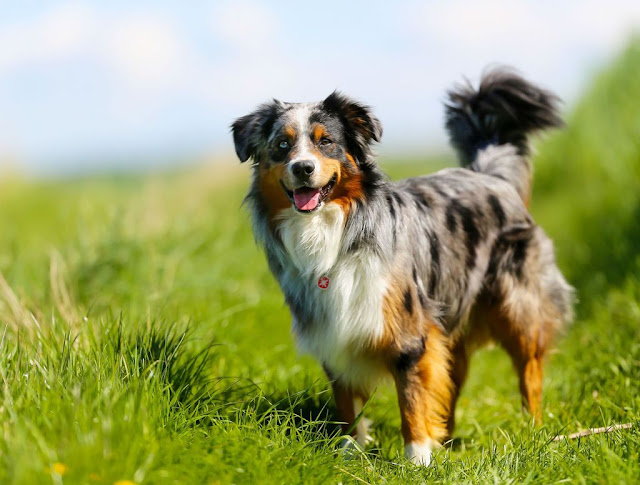
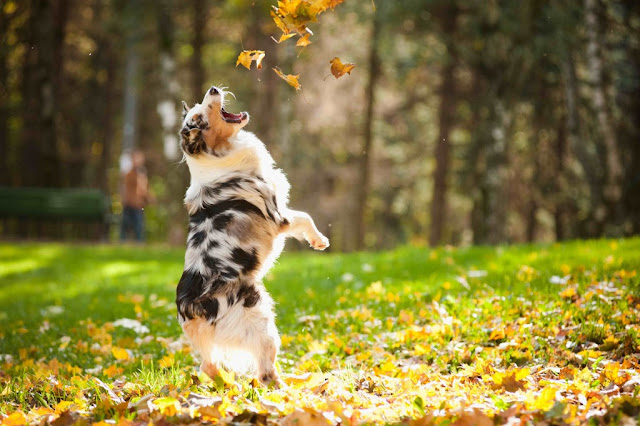
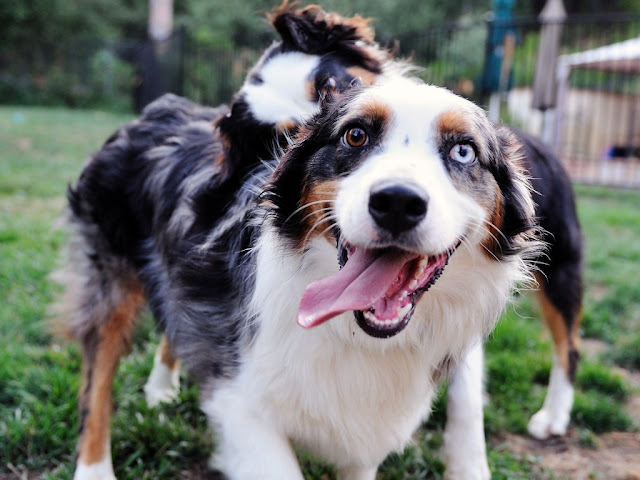
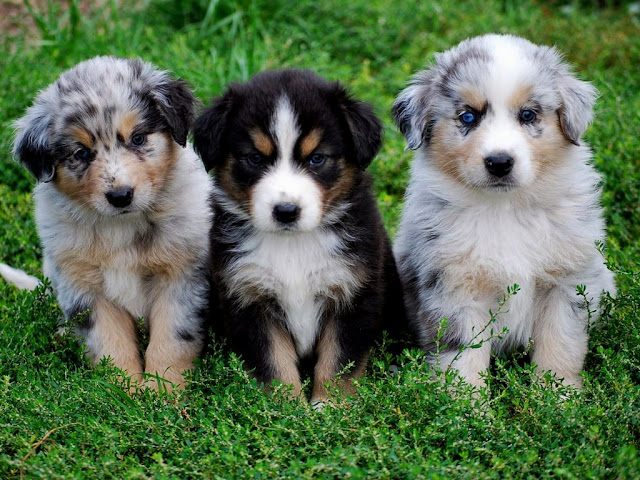
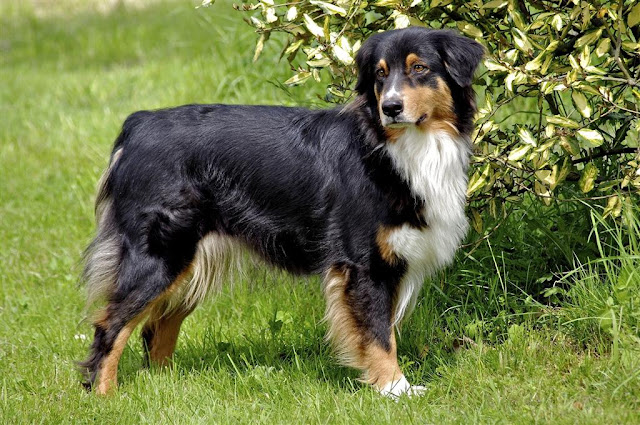
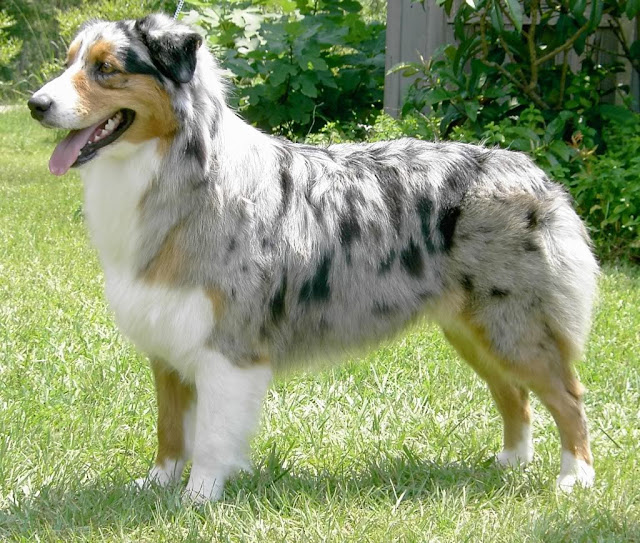













No comments:
Post a Comment